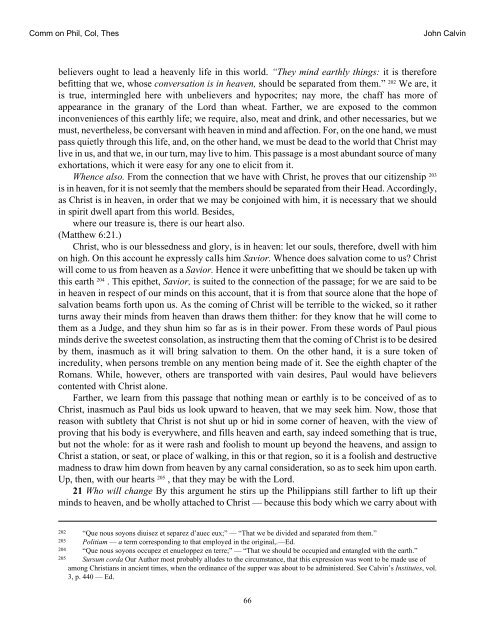Commentary on Philippians, Colossians, and Thessalonians
Commentary on Philippians, Colossians, and Thessalonians
Commentary on Philippians, Colossians, and Thessalonians
You also want an ePaper? Increase the reach of your titles
YUMPU automatically turns print PDFs into web optimized ePapers that Google loves.
Comm <strong>on</strong> Phil, Col, Thes<br />
believers ought to lead a heavenly life in this world. “They mind earthly things: it is therefore<br />
befitting that we, whose c<strong>on</strong>versati<strong>on</strong> is in heaven, should be separated from them.” 202 We are, it<br />
is true, intermingled here with unbelievers <strong>and</strong> hypocrites; nay more, the chaff has more of<br />
appearance in the granary of the Lord than wheat. Farther, we are exposed to the comm<strong>on</strong><br />
inc<strong>on</strong>veniences of this earthly life; we require, also, meat <strong>and</strong> drink, <strong>and</strong> other necessaries, but we<br />
must, nevertheless, be c<strong>on</strong>versant with heaven in mind <strong>and</strong> affecti<strong>on</strong>. For, <strong>on</strong> the <strong>on</strong>e h<strong>and</strong>, we must<br />
pass quietly through this life, <strong>and</strong>, <strong>on</strong> the other h<strong>and</strong>, we must be dead to the world that Christ may<br />
live in us, <strong>and</strong> that we, in our turn, may live to him. This passage is a most abundant source of many<br />
exhortati<strong>on</strong>s, which it were easy for any <strong>on</strong>e to elicit from it.<br />
Whence also. From the c<strong>on</strong>necti<strong>on</strong> that we have with Christ, he proves that our citizenship 203<br />
is in heaven, for it is not seemly that the members should be separated from their Head. Accordingly,<br />
as Christ is in heaven, in order that we may be c<strong>on</strong>joined with him, it is necessary that we should<br />
in spirit dwell apart from this world. Besides,<br />
where our treasure is, there is our heart also.<br />
(Matthew 6:21.)<br />
Christ, who is our blessedness <strong>and</strong> glory, is in heaven: let our souls, therefore, dwell with him<br />
<strong>on</strong> high. On this account he expressly calIs him Savior. Whence does salvati<strong>on</strong> come to us? Christ<br />
will come to us from heaven as a Savior. Hence it were unbefitting that we should be taken up with<br />
this earth 204 . This epithet, Savior, is suited to the c<strong>on</strong>necti<strong>on</strong> of the passage; for we are said to be<br />
in heaven in respect of our minds <strong>on</strong> this account, that it is from that source al<strong>on</strong>e that the hope of<br />
salvati<strong>on</strong> beams forth up<strong>on</strong> us. As the coming of Christ will be terrible to the wicked, so it rather<br />
turns away their minds from heaven than draws them thither: for they know that he will come to<br />
them as a Judge, <strong>and</strong> they shun him so far as is in their power. From these words of Paul pious<br />
minds derive the sweetest c<strong>on</strong>solati<strong>on</strong>, as instructing them that the coming of Christ is to be desired<br />
by them, inasmuch as it will bring salvati<strong>on</strong> to them. On the other h<strong>and</strong>, it is a sure token of<br />
incredulity, when pers<strong>on</strong>s tremble <strong>on</strong> any menti<strong>on</strong> being made of it. See the eighth chapter of the<br />
Romans. While, however, others are transported with vain desires, Paul would have believers<br />
c<strong>on</strong>tented with Christ al<strong>on</strong>e.<br />
Farther, we learn from this passage that nothing mean or earthly is to be c<strong>on</strong>ceived of as to<br />
Christ, inasmuch as Paul bids us look upward to heaven, that we may seek him. Now, those that<br />
reas<strong>on</strong> with subtlety that Christ is not shut up or hid in some corner of heaven, with the view of<br />
proving that his body is everywhere, <strong>and</strong> fills heaven <strong>and</strong> earth, say indeed something that is true,<br />
but not the whole: for as it were rash <strong>and</strong> foolish to mount up bey<strong>on</strong>d the heavens, <strong>and</strong> assign to<br />
Christ a stati<strong>on</strong>, or seat, or place of walking, in this or that regi<strong>on</strong>, so it is a foolish <strong>and</strong> destructive<br />
madness to draw him down from heaven by any carnal c<strong>on</strong>siderati<strong>on</strong>, so as to seek him up<strong>on</strong> earth.<br />
Up, then, with our hearts 205 , that they may be with the Lord.<br />
21 Who will change By this argument he stirs up the <strong>Philippians</strong> still farther to lift up their<br />
minds to heaven, <strong>and</strong> be wholly attached to Christ — because this body which we carry about with<br />
202 “Que nous soy<strong>on</strong>s diuisez et separez d’auec eux;” — “That we be divided <strong>and</strong> separated from them.”<br />
203 Politiam — a term corresp<strong>on</strong>ding to that employed in the original,.—Ed.<br />
204 “Que nous soy<strong>on</strong>s occupez et enueloppez en terre;” — “That we should be occupied <strong>and</strong> entangled with the earth.”<br />
205 Sursum corda Our Author most probably alludes to the circumstance, that this expressi<strong>on</strong> was w<strong>on</strong>t to be made use of<br />
am<strong>on</strong>g Christians in ancient times, when the ordinance of the supper was about to be administered. See Calvin’s Institutes, vol.<br />
3, p. 440 — Ed.<br />
66<br />
John Calvin















